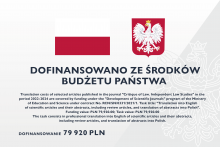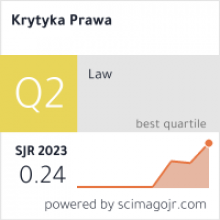About the Journal
We are pleased to announce that our journal has achieved Q2 journal status in the latest Scimago Journal & Country Rank world ranking of scientific journals. This means both a high number of citations of journal articles and high prestige ratings of the journals from which the citations are derived. The ranking includes journals indexed in the Scopus database. "Krytyka Prawa" ranked as the most influential Polish law journal with an index of 0.237.
Three other Polish journals were also included in the Q2 group: 'Santander Art and Culture Law Review', 'Studia Iuridica Lublinensia', Acta Universitatis Lodziensis. Folia Iuridica'. Congratulations to our Colleagues. We sincerely thank all our Authors and Reviewers.
We are also very pleased to announce that “Krytyka Prawa. Niezależne Studia nad Prawem” has been included in the Web of Science™ Emerging Sources Citation Index, thus joining the esteemed group of journals simultaneously indexed in Web of Science, as well as SCOPUS.
“Krytyka Prawa” is the only law journal in Poland indexed in both of the two most leading databases and at the same time ranked in the quartile 2 (Q2), as listed in the latest Scimago Journal & Country Rank of global journals.
A critical attitude toward law is necessary for its proper creation, interpretation, application and functioning. It requires an open, reliable and independent approach to the law as an object of intellectual reflection.
The Authors are kindly invited to exercise critique of the law from the perspective of theory and philosophy of law, social sciences, including economics, sociology, psychology. The topics of the subsequent issues will focus on questions of public law. Above all, we are publishing original articles that might be of interest to the international academic community within the profile of the journal, and texts that are of social or economic importance to Poland.
The scientific legal journal The Critique of Law. Independent Legal Studies (ISSN 2080-1084, eISSN 2450-7938) is issued since 2009.
Papers in English and Polish are accepted. The main version of the journal is the electronic one.
All papers published in The Critique of Law. Independent Legal Studies are available online for free to all users immediately upon publication (Open Access). No author is charged for publishing an article (APCs).
The journal is currently subject to long-term archiving in the National Library of Poland Repository.
The policy of The Critique of Law. Independent Legal Studies is to make it possible for all authors to deposit versions of their work in institutional or any other repository of their choice.
The Critique of Law. Independent Legal Studies provides immediate open access to its content under the Creative Commons BY 4.0 license. Authors who publish with this journal retain all copyrights and agree to the terms of the CC BY 4.0 license.
Translation costs of selected articles published in the journal "Critique of Law. Independent Law Studies" in the period 2022-2024 are covered by funding under the "Development of Scientific Journals" program of the Ministry of Education and Science under contract No. RCN/SN/0331/2021/1. Task title: "Translation into English of scientific articles and their abstracts, including review articles, and translation of abstracts into Polish". Funding value: PLN 79,920.00; Task value: PLN 79,920.00
The task consists in professional translation into English of scientific articles and their abstracts, including review articles, and translation of abstracts into Polish.
CONTACT:
"The Critique of Law. Independent Legal Studies"
Anna Gorynska - Editorial Office Secretary
Kozminski University
59 Jagiellońska St.
03-301 Warsaw, Poland
e-mail: krytykaprawa@kozminski.edu.pl
Recommended publication
Editorial board
EDITOR-IN-CHIEF
Prof. dr. hab. Jolanta Jabłońska-Bonca (Department of Theory, Philosophy and History of Law, Kozminski University, Poland), https://orcid.org/0000-0002-0894-9558, e-mail: jablonska@kozminski.edu.pl
Vice EDITORS-IN-CHIEFS
Prof. Waldemar Hoff (Department of Administrative and Public Economic Law, Kozminski University, Poland) - administration, economy, global problems of contemporary world (current affairs), https://www.kozminski.edu.pl/pl/spolecznosc/wizytowka/prof-alk-dr-hab-wa...
Prof. Małgorzata Skórzewska-Amberg (Department of Theory, Philosophy and History of Law, Kozminski University, Poland), e-mail: mskorzewska@kozminski.edu.pl, https://www.kozminski.edu.pl/pl/spolecznosc/wizytowka/prof-alk-dr-hab-ma...
THEME EDITORS
Prof. Waldemar Hoff (Department of Administrative and Public Economic Law, Kozminski University, Poland) - administration, economy, global problems of contemporary world (current affairs), EU law, international law, https://www.kozminski.edu.pl/pl/spolecznosc/wizytowka/prof-alk-dr-hab-wa...
Prof. Jolanta Jabłońska-Bonca (Department of Theory, Philosophy and History of Law, Kozminski University, Poland) - theory and philosophy of law, legal rhetoric, legal ethics, metodology of science, security, law on higher education and science, constitutional law, https://orcid.org/0000-0002-0894-9558
Prof. dr hab. Andrzej Jakubecki (Institute of Legal Studies, Department of Civil Procedure and International Commercial Law, Maria Curie Sklodowska University, Poland) - civil proceedings, bankrupcy law, restructuring law, commercial law, international commercial law, https://orcid.org/0000-0001-9073-4371
Prof. Joanna Kielin-Maziarz (Department of Constitutional Law, Kozminski University, Poland) - constitutional law, EU law and environmental law, https://orcid.org/0000-0003-1728-3361
Prof. Toshiyuki Kono (Emeritus Professor of Private International Law, Kyushu University, Japan) - international commercial law, private international law, legal comparative studies, intellectual property law, protection of cultural heritage, https://hyoka.ofc.kyushu-u.ac.jp/search/details/K000146/english.html
Prof. Adam Noga (Department of Economics, Kozminski University, Poland) - economy and management, economic analysis of law, https://www.kozminski.edu.pl/pl/spolecznosc/wizytowka/prof-dr-hab-adam-noga
Prof. Hanna Paluszkiewicz (Faculty of Law and Administration, University of Szczecin, Poland) - criminal law, issues of procedural rules, as well as intertemporalism in this field of law, https://orcid.org/0000-0001-5198-8360.
Prof. Przemysław Polański (Department of Quantitative Methods and Applications of Computer Science, Kozminski University, Poland) - intellectual property law, EU law, information society, knowledge management, informatics, https://www.kozminski.edu.pl/pl/spolecznosc/wizytowka/prof-alk-dr-hab-pr...
Prof. Małgorzata Skórzewska-Amberg (Department of Theory, Philosophy and History of Law, Kozminski University, Poland) - logic, legal informatics, criminal law, new technology law https://www.kozminski.edu.pl/pl/spolecznosc/wizytowka/prof-alk-dr-hab-ma...
Prof. Konrad Zacharzewski (Department of Civil Law, Kozminski University, Poland) - commercial law, the law of obligations, digital currency law, capital market law, securities law, banking law, https://orcid.org/0000-0002-9850-6020
Prof. Kamil Zeidler (Faculty of Law and Administration, Department of Theory and Philosophy of State and Law, Gdansk University, Poland) - theory and philosophy of law, aesthetic of law, legal rhetoric, protection of cultural heritage, legal comparative studies, https://orcid.org/0000-0002-8396-3608
Prof. Robert Zieliński (Department of Administrative and Public Economic Law, Kozminski University, Poland) - budget, tax, customs, foreign exchange law, banking, currency, financial law of governmental units, market law, financial, international financial law, https://www.kozminski.edu.pl/pl/spolecznosc/wizytowka/prof-alk-dr-hab-ro...
ASSISTANT EDITOR-IN-CHIEF
Anna Gorynska (Kozminski University, Poland), e-mail: gorynska@kozminski.edu.pl
SOCIAL MEDIA
Wiktor Krzymowski, PhD (Department of Theory, Philosophy and History of Law, Kozminski University, Poland), e-mail: wkrzymowski@kozminski.edu.pl
Dawid Kostecki, PhD (Department of Theory, Philosophy and History of Law, Kozminski University, Poland), e-mail: dkostecki@kozminski.edu.pl
SCIENTIFIC BOARD
Prof. dr Adam Czarnota - chairman (Riga Graduate School of Law, Latvia), https://www.rgsl.edu.lv/about-rgsl/people/adam-czarnota
Prof. dr Giuseppe Contini ( Cagliari University, Italy)
Prof. dr Maksymilian Del Mar (Queen Mary College, University of London, United Kingdom), https://www.qmul.ac.uk/law/people/academic-staff/items/delmar.html
Dr Agata Fijalkowski (Leeds Beckett University, United Kingdom), https://orcid.org/0000-0001-5204-6631
Prof. Fernando de Castro Fontainha (FGV Direito, Rio de Janeiro, Brasil), http://www.iesp.uerj.br/docentes/fernando-de-castro-fontainha/
Prof. dr Martin Krygier (University of New South Wales Sydney, Australia), https://www.unsw.edu.au/staff/martin-krygier
Prof. dr hab. Jacek Matuszewski (Lodz University, Poland)
Prof. Ignacio Aymerich Ojea (Universitat Jaume I, Castellón de la Plana, Spain)
Prof. dr Gianluigi Palombella (Sant' Anna Scuola Universitaria Superiore Pisa, Italy), https://www.santannapisa.it/it/gianluigi-palombella
Prof. dr Stephan Parmentier (Catholic University Leuven, Belgium), https://www.law.kuleuven.be/linc/english/staff/00016825
Prof. dr hab. Maksymilian Pazdan (Kozminski University, Warsaw; University of Silesia in Katowice, Poland), https://www.kozminski.edu.pl/pl/spolecznosc/wizytowka/prof-dr-hab-maksym...
Prof. dr hab. Alicja Pomorska, professor emeritus (Maria Curie-Skłodowska University, Lublin, Poland)
Prof. Jiri Priban (University College Cardiff, Wales, United Kingdom), https://www.cardiff.ac.uk/people/view/478897-priban-jiri
Prof. dr hab. Tadeusz Wiśniewski (Kozminski University, Warsaw, Poland)
Prof. dr hab. Fryderyk Zoll (Jagiellonian University, Cracow, Poland, Universität Osnabrück, Germany), https://orcid.org/0000-0001-7263-2670
INTERNATIONAL COMMITTEE OF CONSULTANTS AND REVIEWERS
Prof. dr hab. Zdzisław Brodecki (University of Business and Administration in Gdynia), Poland, https://wsaib.pl/o-uczelni/kadra/item/4153-zdzislaw-brodecki
Prof. Michalina Duda-Hyz (Univeristy of Opole), Poland, https://orcid.org/0000-0001-7058-3481
Prof. UŁ dr hab. Henryk Dzwonkowski (University of Lodz), Poland, https://www.wpia.uni.lodz.pl/struktura/pracownicy/henryk-dzwonkowski.html
Prof. Sibel Hacımahmutoğlu ( Hacettepe University), Turkey, http://www.hukukfakultesi.hacettepe.edu.tr/tr/docdrsibel_hacimahmutoglu-21
Prof. dr hab. Ivan Halász (National University of Public Service; Centre for Social Sciences, Institute of Legal Studies. Hungarian Academy of Sciences, Budapest, Hungary), https://jog.tk.hu/en/researcher/halasz-ivan
Prof. Javier Alonso Madrigal (Universidad Pontificia Comillas, Spain), https://web.comillas.edu/profesor/fjalonso
Prof. Artur Mudrecki (Kozminski University, Poland), https://www.kozminski.edu.pl/pl/spolecznosc/wizytowka/prof-alk-dr-hab-ar...
Prof. Petr Mrkývka (Masaryk University, Brno, Czech Republic), https://www.muni.cz/en/people/632-petr-mrkyvka
Prof. Anna Musiała (Adam Mickiewicz University, Poznań, Poland), https://orcid.org/0000-0001-5788-9144
Dr Volodymyr Nesterovych (Lugansk State University of Internal Affairs named after E.O. Didorenko, Ukraine; Scientific Advisory Board of the Supreme Court of Ukraine), https://orcid.org/0000-0003-2614-0426
Prof. Ihor Ozerskyi (Petro Mohyla Black Sea State University, Mikolaiv, Ukraine), https://chmnu.edu.ua/ozerskij-igor-volodimirovich/
Prof. Magdalena Olczyk (Kozminski University, Poland), https://www.kozminski.edu.pl/pl/spolecznosc/wizytowka/prof-alk-dr-hab-ma...
Prof. Ewa Popławska (The Institute of Law Studies of the Polish Academy of Sciences, Poland)
Prof. Michal Radvan (Masaryk University, Brno, Czech Republic), https://orcid.org/0000-0002-9858-4555
Prof. Colin Scott (University College Dublin, Dublin, Irland), https://orcid.org/0000-0002-0486-8670
Prof. UWM dr. hab. Agnieszka Skóra (University of Warmia and Mazury in Olsztyn), Poland, https://orcid.org/0000-0003-2169-5326
Prof. dr. Ruth Taplin (Centre for Japanese and East Asian Studies, London, UK)
Prof. Alexander Vashkevich (European Humanitarian University, Vilnius, Lithuania), https://en.ehu.lt/staff/aliaksandr-vashkevich/
Prof. UŁ dr hab. Mirosław Włodarczyk (University of Lodz, Poland), https://orcid.org/0000-0002-1974-1584
Prof. Jacques Ziller (Università di Pavia, Italy), https://orcid.org/0000-0001-7593-1895
Dr hab. Jacek Zrałek (University of Silesia, Katowice, Poland), https://orcid.org/0000-0003-2813-8557
TRANSLATOR
Adrian Sikora, https://www.letterperfect.pl
STATISTICAL EDITOR
Dr. Ewa M. Kwiatkowska, https://www.kozminski.edu.pl/pl/spolecznosc/wizytowka/dr-ewa-kwiatkowska
Information for Authors
Information for Reviewers
- Scientific articles that have been submitted for review are reviewed by two reviewers (independently) appointed by subject editors. The Editorial Section makes every effort to appoint reviewers from outside the scientific unit affiliated by the author of the publication submitted for review.
- The identity of the authors is not disclosed to the reviewers.
- The identity of the reviewers is not disclosed to the authors.
- Instructions for reviewers regarding submitting reviews via the Scholar One Manuscript System are available here.
- The review (download review form) contains, among others, the reviewer’s unambiguous conclusion concerning the conditions of accepting the scientific article for publication or rejecting it.
In arbitrary cases (e.g. incompatible or contradictory reviews), the Editorial Section will decide whether a paper should be accepted for publication or not.
DUTIES OF REVIEWERS
Contribution to editorial decisions: Peer reviews assist the editor in making editorial decisions and may also help authors to improve their manuscript.
Promptness: Any selected referee who feels unqualified to review the research reported in a manuscript or knows that its timely review will be impossible should notify the editor and excuse himself/herself from the review process.
Confidentiality: All manuscript received for review must be treated as confidential documents. They must not be shown to or discussed with others except those authorized by the editor.
Standards of objectivity: Reviews should be conducted objectively. Personal criticism of the author is inappropriate. Referees should express their views clearly with appropriate supporting arguments.
Acknowledgement of sources: Reviewers should identify the relevant published work that has not been cited by authors. Any substantial similarity or overlap between the manuscript under consideration and any other published paper should be reported to the editor.
Disclosure and conflict of Interest: Privileged information or ideas obtained through peer review must be kept confidential and not used for personal advantage. Reviewers should not consider evaluating manuscripts in which they have conflicts of interest resulting from competitive, collaborative, or other relations with any of the authors, companies, or institutions involved in writing a paper.
Ethical standards
PUBLICATION ETHICS AND PUBLICATION MALPRACTICE STATEMENT
These statements below are based on COPE’s Best Practice Guidelines for Journal Editors https://publicationethics.org/core-practices
The following are the standards of expected ethical behaviour for all parties involved in publishing in the The Critique of Law. Independent Legal Studies journal: the author, the journal editor and editorial board, the peer reviewers and the publisher.
All the articles submitted for publication in The Critique of Law. Independent Legal Studies are peer reviewed for authenticity, ethical issues and usefulness.
DUTIES OF EDITORS
Monitoring the ethical standards: Editorial board is monitoring the ethical standards of scientific publications and takes all possible measures against any publication malpractices.
Fair play: Submitted manuscripts are evaluated for their intellectual content without regard to race, gender, sexual orientation, religious beliefs, citizenship, or political ideology.
Publication decisions: The editor is responsible for deciding which of the submitted articles should or should not be published. The decision to accept or reject a paper for publication is based on its importance, originality, clarity, and its relevance to the scope of the journal.
Confidentiality: The editor and the members of the editorial board must ensure that all materials submitted to the journal remain confidential while under review. They must not disclose any information about a submitted manuscript to anyone other than the authors, reviewers, potential reviewers, other editorial advisers, and the publisher.
Disclosure and conflict of interest: Unpublished materials disclosed in the submitted manuscript must not be used by the editor and the editorial board in their own research without written consent of authors. Editors always precludes business needs from compromising intellectual and ethical standards.
Maintain the integrity of the academic record: The editors will guard the integrity of the published academic record by issuing corrections and retractions when needed and pursuing suspected or alleged research and publication misconduct. Plagiarism and fraudulent data is not acceptable.
Editorial board always be willing to publish corrections, clarifications, retractions and apologies when needed.
Retractions of the articles: Journals editors will consider retracting a publication if:
- they have a clear evidence that the findings are unreliable, either as a result of misconduct (e.g. data fabrication) or honest error (e.g. miscalculation or experimental error)
- the findings have previously been published elsewhere without proper cross-referencing, permission or justification (cases of redundant publication)
- it constitutes plagiarism or reports unethical research.
Notice of the retraction should be linked to the retracted article (by including the title and authors in the retraction heading), clearly identify the retracted article and state who is retracting the article. Retraction notices should always mention the reason(s) for retraction to distinguish honest error from misconduct.
Retracted articles will not be removed from printed copies of the journal nor from electronic archives but their retracted status will be indicated as clearly as possible.
DUTIES OF AUTHORS
Reporting standards: Authors of reports of original research should present an accurate account of the work performed as well as an objective discussion of its significance. Underlying data should be represented accurately in the paper. The paper should contain sufficient detail and references to permit others to replicate the work. The fabrication of results and making of fraudulent or inaccurate statements constitute unethical behaviour and may cause rejection or retraction of a manuscript or a published article.
Originality and plagiarism: Authors should ensure that they have written entirely original works, and if the authors have used the work and/or words of others they need to be cited or quoted. Plagiarism and fraudulent data is not acceptable.
Data access retention: Authors may be asked to provide the raw data for editorial review, should be prepared to provide public access to such data, and should be prepared to retain such data for a reasonable time after publication of their paper.
Multiple or concurrent publication: Authors should not in general publish a manuscript describing essentially the same research in more than one journal. Submitting the same manuscript to more than one journal concurrently constitutes unethical publishing behaviour and is unacceptable.
Authorship of the manuscript: Authorship should be limited to those who have made a significant contribution to the conception, design, execution, or interpretation of the report study. All those who have made contributions should be listed as co-authors.
The corresponding author should ensure that all appropriate co-authors and no inappropriate co-authors are included in the paper, and that all co-authors have seen and approved the final version of the paper and have agreed to its submission for publication.
Acknowledgement of sources: The proper acknowledgment of the work of others must always be given. The authors should cite publications that have been influential in determining the scope of the reported work.
Fundamental errors in published works: When the author discovers a significant error or inaccuracy in his/her own published work, it is the author’s obligation to promptly notify the journal editor or publisher and cooperate with the editor to retract or correct the paper.
DUTIES OF REVIEWERS
Contribution to editorial decisions: Peer reviews assist the editor in making editorial decisions and may also help authors to improve their manuscript.
Promptness: Any selected referee who feels unqualified to review the research reported in a manuscript or knows that its timely review will be impossible should notify the editor and excuse himself/herself from the review process.
Confidentiality: All manuscript received for review must be treated as confidential documents. They must not be shown to or discussed with others except those authorized by the editor.
Standards of objectivity: Reviews should be conducted objectively. Personal criticism of the author is inappropriate. Referees should express their views clearly with appropriate supporting arguments.
Acknowledgement of sources: Reviewers should identify the relevant published work that has not been cited by authors. Any substantial similarity or overlap between the manuscript under consideration and any other published paper should be reported to the editor.
Disclosure and conflict of Interest: Privileged information or ideas obtained through peer review must be kept confidential and not used for personal advantage. Reviewers should not consider evaluating manuscripts in which they have conflicts of interest resulting from competitive, collaborative, or other relations with any of the authors, companies, or institutions involved in writing a paper.
Contact
"The Critique of Law. Independent Legal Studies"
Anna Gorynska - Editorial Office Secretary
Kozminski University
59 Jagiellońska St.
03-301 Warsaw, Poland
e-mail: krytykaprawa@kozminski.edu.pl
Please be kindly informed that the editorial staff of the Krytyka Prawa will not respond to e-mails that do not have an address set up on a confirmed institutional domain, i.e. registered by a scientific institution or a law firm. In some exceptional cases, the staff allows correspondence from an e-mail address other than above-mentioned, provided that the author is able to confirm by other means and beyond any doubt his or her identity. All other correspondence will be considered as spam by the editors of the journal and left unanswered.







